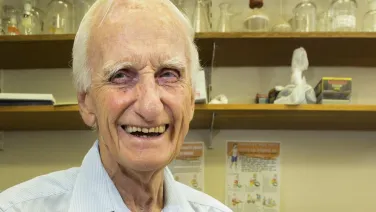News & events
News & events
Find out about our latest news and events.

On Monday, 28 November, Emeritus Professor Howard Bradbury passed away.

Howard worked tirelessly to translate science into effective actions to improve the lives of some of the poorest people in the world. His passion, humour and determination inspired many of us and one of his greatest wishes was to see that work to prevent konzo continue. We will do our best to honour his legacy.

Howard Bradbury followed in his father’s footsteps. “Dad was a chemist and he used to keep telling me stories about it all the time. I couldn’t understand what he said, but somehow something just rubbed off and so I always thought science would be real fun, so I just went into it. I must say I’ve enjoyed every minute."

Tackling one of tropical Africa's crippling epidemic diseases has been an interesting and demanding retirement project, as HOWARD BRADBURY AM writes. Through our work, konzo has now been prevented in 16 villages, which has involved more than 10,000 people.
I’ll share some of the latest data on animal movement around the planet. I will highlight how this helps us to preserve biodiversity, to secure our global food supplies, to anticipate pandemics and potentially to predict natural disasters.
The study of animal ‘personality’, or consistent individual differences in behaviour, has received much attention in the last two decades, but several important questions remain unclear.
Animals live in an ever-changing world, but environmental perturbations are occurring at an alarming rate - threatening biodiversity and population persistence.
I examine how some established population genetic models can be extended to accommodate insights from newer data and analytic methods.
Individuals can benefit by varying their investment in offspring. The optimal amount of investment may vary in relation to both climatic conditions and social conditions (such as the number of carers for the offspring).
Why do organisms look the way they do? Why do they live where they do? Wy are some groups more diverse than others? These basic questions are often addressed at different scales using a particular set of methods.